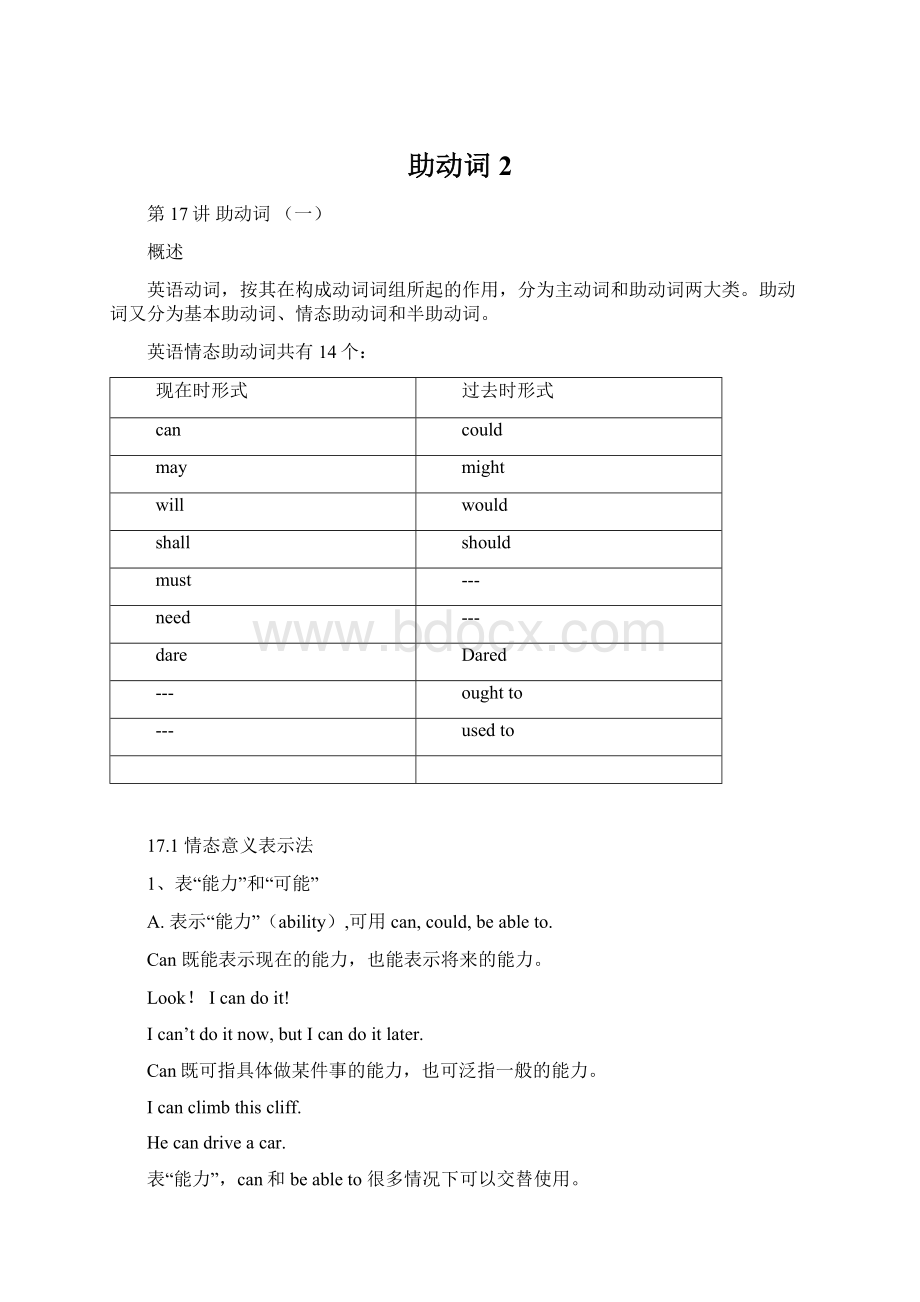助动词 2Word下载.docx
《助动词 2Word下载.docx》由会员分享,可在线阅读,更多相关《助动词 2Word下载.docx(15页珍藏版)》请在冰豆网上搜索。

Hemay/mightbestillwaitingatthedoor.
在疑问句中表“可能’,须用can而不用may.
Wherecanhebe?
表示“不可能”,通常用can’t.
Shecan’tlovehim.
用can表示可能,较多的用于否定句和疑问句,而could不受此限制。
Itcan’t/couldn’tbetrue.
Ifyoudon’thaveaguide,youcouldloseyourway.
表示过去的可能,可用may/might+不定式完成体或不定式完成进行体。
Hemay/mighthavebeenhurt.
Youmighthavekilledyourself.
也可以用can/could+不定式完成体表示可能。
Hecan’t/couldhavebeenhurt.
用might/could+不定式完成体有时可以表示本来可以做却没有做。
Youmighthavefinishedtheworklastweek.
Icouldhavepassedtheexamination,butIfailed.
2、表示“许可”和“不许”。
A.请求对方许可(permission)可用can,could,may,might.
May/can与might/could相比,后者较为婉转,更有礼貌。
在口语中常用can表许可。
Can/could/may/mightIsmokehere?
表示“给予许可”,常用May/can,不用might/could。
CouldIuseyourphone?
Yes,ofcourseyoucan.
B.表示不许可用maynot或者cannot
CanIgooutforamoment?
No,youcan’t.
MayIuseyourcarforafewdays?
No,youmaynot.
注意maynot表示“不许可”的过去形式并不是mightnot.
Hemaynotgo.(Idon’tpermithimtogo)
Hemightnotgo.(possiblyhewillnotgo.)
若要表示过去不“许可”,通常可以说:
Hewasnotallowedtogo.
Ididn’tpermithimtogo.
3、表示“义务”和“必然”。
A.所谓表示义务(obligation),即表示必须、应该做某事。
表示这些意义,可用should,oughtto,must. 用这三个情态助动词表示义务,其口气强弱略有差别。
用should/oughtto表示应该,带有劝说之意,两者可以交替使用。
Weshouldlearnfromthemodelworkers
Youshould/oughttodrinkless.
Should/oughtto+不定式完成体,表示本应该做却没做,或本不应该做却做了。
Youshould/oughttohaveaskedmypermissionfirst.
Youshouldn’t/oughtn’ttohavebeenrestingatthattimeofday.
Must(必须)表示敦促或者命令,表示将来或者过去的必须,使用haveto的相关形式。
Youmustbebackbyteno’clock.
We’llhavetodoitagain.
Ihadtoleaveatsixyesterday.
Must的否定形式有两种。
一种是mustnot,mustn’t,表示禁止;
第二种是neednot,needn’t,表示不必。
Youmustn’ttalklikethat.
Youneedn’tdoitonce.
Needn’t相当的形式有:
don’tneedto/don’thaveto/haven’tgotto.
Youdon’tneedtodoitonce.
Youdon’thavetodoitonce.
Youhaven’tgottodoitonce.
过去形式通常用didn’tneedto,didn’thaveto
Youdidn’thavetodoitonce.
表示必须,must与haveto的意义接近,但must更侧重表主观,haveto表客观。
Hemustmovethefurniturehimself.
B.所谓表示必然(necessity)就是根据说话人的判断和推测认为必然会有某种情况。
表示这种意义,可用should,oughtto和must,其中以用must口气最为肯定。
Sheshouldbehereinaminute.
Theseyoungtreesoughttoprovideshadeintenyears.
Carelessreadingmustgivepoorresults.
表示否定的推测,则需要使用can’t
Youcan’thaveanydifficultygettingthetickets.
如果表示过去的推测,用must/can’t+不定式完成体
Hereyesarered.Shemusthavebeencrying.
Hecan’thavebeentoyourhome.Hedoesn’tknowyouraddress.
4、表“预见”与“推测”
A.表示预见(prediction),即表示单纯将来,可用will/shall+不定式。
除英格兰以外的说英语国家如美国、新西兰、南非的标准英语中,shall已完全为will所取代,这就是说,will可用于一切人称表示将来。
B.表示推测(predictability),除用should,oughtto和must外,还可用will/would.
Will表示推测,口气低于must,would次之
Theyshould/oughttobehomebynow.
Theywouldbehomebynow.
Theywillbehomebynow.
Theymustbehomebynow.
5、表示“意图”、“意愿”和“决心”。
A.表示意愿(willingness),即愿意做某事,可用will,would,shall.用will表示意愿,可用于一切人称的主语.
Iwilllendyouthemoneyifyouneedit.
Willyousingatthepartytomorrowevening?
Willyoupleaseopenthedoorforme?
Wouldyoulendmeyourpenaminute?
Certainly,Iwill.【表示接受请求时,用will】
表示不愿意,可以用willnot/won’t
Iwillnotdoanythingforyou.
用shall表意图,一般适用于第二、第三人称。
Youshallstaywithusaslongasyoulike.(说话人意愿)
Shallyoutakeaholidaythissummer?
(听话人意愿)
B.表示意图(intention),即打算做某事,也可用will,would,shall.Will可用于所有人称,表示过去的意图可用would.
Iwillwritetohertomorrow.
Whywillyougothere?
Hewouldseeherthenextday,sohedidn’twritetoher.
用shall表“意图”,常用语第二、三人称,表示说话人意图。
在疑问句中,表示征询听话人得意图。
Youshallgetapromotion.(I’llgiveyouapromotion.)
ShallIcarrythesuitcaseforyou?
C.表示决心(determination),既坚持要做某事,也可用will,would,shall,均需重读,且不能缩写。
Will表示“决心”,“坚持”,表过去的决心,可用would.
Iwilltakethejobandnooneisgoingtostopme.
Ifyouwillgo,youmaygoatonce.
Shewouldmarryhiminspiteofmywarningthatiswasunwise.
Shall表决心,主要用语第二、三人称
Youshallobeymyorders.
Heshallleavethecountryatonce.
Shall这种用法的否定形式,表示说话人禁止,威胁。
Foreigncountriesshallnotinterfereinourinternalaffairs.
6、其他情态意义。
A.should可在某些语境中表示惋惜、忧虑、欢欣、惊讶等感情色彩。
Theywereamazedthatsheshouldhavedonesomuchinsoshortatime.
在某些惯用的疑问句中
HowshouldIknow?
在某些虚拟句式中使用,并不表示情态意义。
Iinsistedthathego/shouldgowithme.
B.would可用于委婉的陈述,请求等
Idon’tthinkhewouldbesocareless.
Wouldyouliketostayheretonight?
C.作为情态助动词表示胆敢,dare通常只用于否定陈述句和疑问句。
Idarenotgothere.
Howdarehesaysuchrudethingsaboutme?
Dare还可用作主动词,也通常用于否定和疑问句,带或不带to均可。
Shedidn’tdare(to)sayanythingaboutit.
D.need即可作情态动词,也可做主动词,表示“必须”、“需要”。
作为情态动词,need只用语否定句和疑问句。
Heneedn’tworryaboutit.
NeedIcollecttheparcelmyself?
作情态助动词提问,其答语如果思肯定的,须用must;
如果答语是否定的,则用needn’t.
“needn’t+不定式完成体“表示本不必做却做了,和didn’tneedto是有区别的。
Youneedn’thaveboughtthathouse.
Ididn’tneedtogotothestation.
Ineedn’thavegonetothestation.
E.usedto(只有过去时形式,没有现在时形式)表示过去习惯动作或状态,这种情况现已不复存在。
Thereusedtobeanoldtempleatthecornerofthestreet,butitwasdestroyedinthewarandhasneverbeenrebuilt.
HeusedtoliveinShanghai,buthehaslonggivenupsmoking.
Usedto的否定形式,可以用usedn’t,didn’tuseto.
Hedidn’tusetosmokecigarettes.
Heusedn’ttosmokecigarettes.
17.2情态动词的推测性和非推测性(略)
Lecture18助动词
(二)
本讲将介绍的是半助动词(Semi-auxiliary)以及助动词(Auxiliary)的缩略形式(ContractedForm)。
18.1半助动词
半助动词指在功能上介乎主动词和助动词之间、本身带有词义的一类结构。
下面就半助动词的类型以及半助动词与it...that结构的转换关系作一些介绍。
1)半助动词的类型
(1)
从形态上看,可以分成三类:
以be为其中心成分;
以have为中心成分;
以seem等为其中心成分。
从能否与it...that结构进行转换上看又可以分为能与不能两类(p210-211表格)
具体举例(P211)
由上述诸例可知,半助动词后的主动词无一例外地用不带to不定式,这种不定式可以是一般式,也可以是进行体或完成体形式。
现就以besupposedto(作“应该”解)为例来说明。
Whyareyoudrivingsofastinthisarea?
Youaresupposedtoknowthespeedlimit.
Motherisstillnotquitewell.Sheisnotsupposedtobeworkingsohard.
Whyhaven'
tyoufinishedyourpaperyet?
Youaresupposedtohavefinisheditbytomorrow.
2)半助动词与“it...that”结构
(1)
前述带有第一类半助动词作为限定动词词组一部分的句子不能与it...that结构相互转换。
例如可以说Theboytendedtobelate.但不能说Ittendedthattheboywaslate.
而带有第二类半助动词作为限定动词词组一部分的句子则能与it...that结构相互转换.
例如可以说Theboyseemedtobelate.也可以说Itseemedthattheboywaslate
为了便于说明,不妨把it...that结构称为句型I,而把“半助动词+不定式”结构称为句型II.例如:
Itappearsthathehasmanyfriends.[I]
Heappearstohavemanyfriends.[II]
句型II中的不定式是采取一般形式、进行体形式还是完成体形式,是采取主动态还是被动态,取决于句型I中that-分句的限定动词词组形式。
具体例子:
(P212)
18.2助动词的缩略形式(略)
第十七讲情态动词【传统分类】
一、情态动词的基本用法
1.
can
(could)
1)表示能力,could主要指过去时间。
Two
eyes
see
more
than
one.
两只眼比一只眼看得清。
Could
the
girl
read
before
she
went
to
school?
这女孩上学前能识字吗?
2)表示可能(理论上或是逻辑判断上)。
He
can’t
(couldn’t)
have
enough
money
for
a
new
car.
他不可能有足够的钱买新车。
You
mustn’t
smoke
while
you’re
walking
around
in
wood.You
could
start
fire.
在林子里走时勿吸烟,那样可能会引起火灾。
3)表示允许。
Can
I
look
at
your
pen?
我可以看一看你的新钢笔吗?
asked
whether
he
take
book
out
of
reading—room.
他问他可不可以把书带出阅览室。
4)表惊异、怀疑、不相信等态度。
主要用于否定句、疑问句或感叹句中。
Where
they
gone
to?
他们会去哪儿了呢?
can´
t
be
over
sixty.
他不可能超过六十岁。
How
you
so
careless?
你怎么这么粗心?
5)比较委婉客气地提出问题或陈述看法。
(Could)
lend
me
hand?
帮我一把好吗?
I’m
afraid
we
couldn’t
give
an
answer
today.
恐怕我们今天不能给你答复。
2.
may
(might)
1)表允许,might可以指过去时间,也可指现在时间,语气更委婉。
whatever
like.
你喜欢什么就拿什么。
told
that
might
room.
他告诉我可以在房间里抽烟。
May
(Might)
ask
photo
baby?
我可以要一张你宝宝的照片吗?
在回答以may引起的问句时,多避免用这个词,而用其它方式,如Yes,
please.
/
Certainly.
/
Please
don´
./
You´
d
better
not.
No,
mustn’t.等,以免显得太严峻或不客气。
2)表可能(事实上)。
可以指过去时间,也可以指现在时间,但语气更加不肯定。
home.
他可能在家。
She
not
know
about
it.
她可能不知道这件事。
was
agree
with
him.
他担心他们可能不同意他的意见。
They
having
meeting,
but
I´
m
sure.
他们有可能在开会,不过我不肯定。
3.
must
1)表示义务。
意为”必须”(主观意志)。
We
do
everything
step
by
step.
我们一切都必须循序渐进地做。
You
talk
her
like
that.
你不能那样对她说话。
--Must
hand
our
exercise—books
now?
我们现在就要交练习本吗?
--No,
needn’t.
don’t
to.
不必。
(这种情况下,一般不用mustn’t)
2)表示揣测。
意为”想必、准是、一定”等,只用于肯定句。
He
ill.
looks
pale.
他准是病了。
他的脸色苍白。
She´
s
wearing
diamond
necklace.
lot
money.
她戴着钻石项链,一定很有钱。
4.
shall
1)表征询意见,用于第一、第三人称疑问句。
Shall
get
some
tea?
我给你点茶好吗?
boy
wait
outside?
让那男孩在外面等吗?
What
this
evening?
我们今晚做什么?
2)表说话人的意愿,有”命令、允诺、警告、决心”等意思,用于第二、第三人称陈述句。
as
say.
按我说的做。
(命令)
my
tomorrow.
你明天可以得到我的答复。
(允诺)
sorry
it
one
day,
tell
you.
有一天他会后悔的,我告诉你。
(警告)
Nothing
stop
us
from
carrying
plan.
什么也不能阻止我们执行这项计划。
(决心)
5.will
1)表意愿,用于各种人称陈述句。
I
will
anything
我愿为你做任何事。
None
is
blind
those
who
won´
see.
不愿看的人眼最瞎。
If
book,
I’l